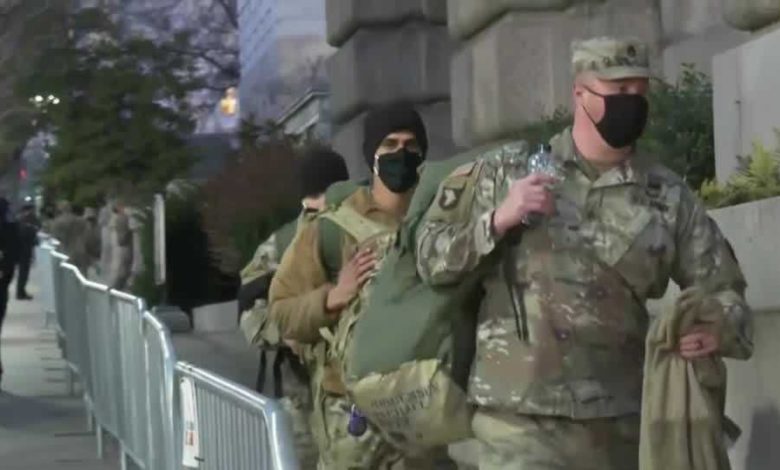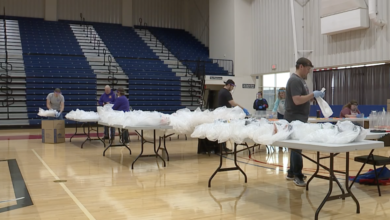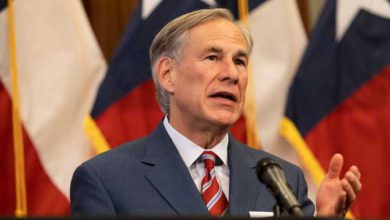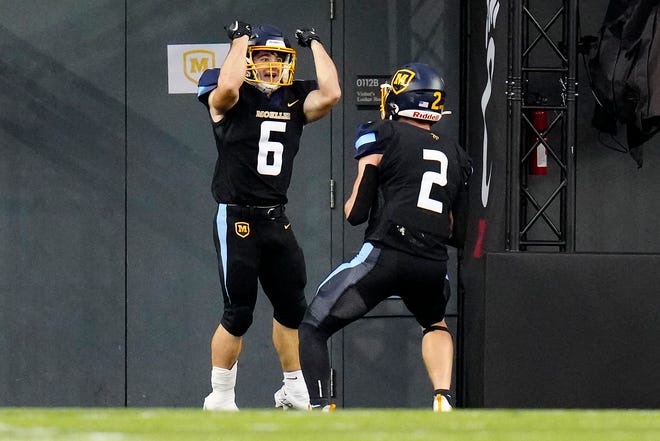

Ohio's virus situation is so concerning right now, the governor activated the National Guard Friday to help ease the strain on beleaguered hospital staffs around the state.At a statewide media briefing this morning, Gov. Mike DeWine cut straight to the chase."This morning, I ordered 1,050 members of our Ohio National Guard into our hospitals," he said.It was a turnaround from earlier in the week when he expressed a reluctance to do so.There are a number of Guard reserves who work in the medical field already and DeWine was concerned about robbing Peter to pay Paul as the phrase goes.But he has spent time with Guard command to make sure that won't happen.More people are hospitalized with COVID-19 right now in the state than at any other point this year.And the number is said to be rapidly approaching an all-time high.DeWine described the current pressure and stress on hospital staff as "unprecedented.""Early in the pandemic, our concern in our hospitals was about beds, was about space. Today it is about personnel," DeWine said.The shortage of staff in the southwest Ohio region coincides with hospitalizations and intensive care unit admissions that are rivaling a year ago.This part of the state will get non-medical National Guard personnel. Tiffany Mattingly, vice president of clinical strategies for the Health Collaborative, explained how they can make a difference."The amount of time it takes to turn over a room once a patient is discharged, to get that room cleaned, to get it sanitized and ready for the next patient and fully-stocked, those are some of the things the National Guard can do to help move people through the ED into an in-patient room quicker," she said.She called the governor's decision to call out the Guard an immediate positive in this sense."No. 1, just a recognition that the staff are in this situation is really helpful. To them, they see support coming. I think that in and of itself can help their mental health and well-being," Mattingly said.National Guard personnel will start fanning out Monday.DeWine is also trying to finalize an agreement with an Ohio-based health care company to bring in out-of-state nurses from other parts of the country where the caseload is not as severe.So, that would be someplace other than Pennsylvania, Michigan or Indiana.The dire situation has been building to this point in recent weeks and there's a deepening winter worry.In an average year, flu typically hospitalizes 1,500 patients in Ohio.There are about 250 hospitalized cases in the state so far.DeWine pointed to some positive indicators.So far this month, 101,000 Ohioans have had their first shot and 514,000 have had their booster."We know that booster shots are huge in keeping people out of the hospital," he stressed.That's the game as the medical community sees it in a nutshell.The governor also asked that schools insist on masks at least for the next four weeks as doctors pay attention to the transmission of omicron."I'm hoping that this will gain some attention from the public as well and that they will help support by getting vaccinated, wearing the mask, thinking critically about their holiday plans," Mattingly said.
Ohio's virus situation is so concerning right now, the governor activated the National Guard Friday to help ease the strain on beleaguered hospital staffs around the state.
At a statewide media briefing this morning, Gov. Mike DeWine cut straight to the chase.
"This morning, I ordered 1,050 members of our Ohio National Guard into our hospitals," he said.
It was a turnaround from earlier in the week when he expressed a reluctance to do so.
There are a number of Guard reserves who work in the medical field already and DeWine was concerned about robbing Peter to pay Paul as the phrase goes.
But he has spent time with Guard command to make sure that won't happen.
More people are hospitalized with COVID-19 right now in the state than at any other point this year.
And the number is said to be rapidly approaching an all-time high.
DeWine described the current pressure and stress on hospital staff as "unprecedented."
"Early in the pandemic, our concern in our hospitals was about beds, was about space. Today it is about personnel," DeWine said.
The shortage of staff in the southwest Ohio region coincides with hospitalizations and intensive care unit admissions that are rivaling a year ago.
This part of the state will get non-medical National Guard personnel.
Tiffany Mattingly, vice president of clinical strategies for the Health Collaborative, explained how they can make a difference.
"The amount of time it takes to turn over a room once a patient is discharged, to get that room cleaned, to get it sanitized and ready for the next patient and fully-stocked, those are some of the things the National Guard can do to help move people through the ED into an in-patient room quicker," she said.
She called the governor's decision to call out the Guard an immediate positive in this sense.
"No. 1, just a recognition that the staff are in this situation is really helpful. To them, they see support coming. I think that in and of itself can help their mental health and well-being," Mattingly said.
National Guard personnel will start fanning out Monday.
DeWine is also trying to finalize an agreement with an Ohio-based health care company to bring in out-of-state nurses from other parts of the country where the caseload is not as severe.
So, that would be someplace other than Pennsylvania, Michigan or Indiana.
The dire situation has been building to this point in recent weeks and there's a deepening winter worry.
In an average year, flu typically hospitalizes 1,500 patients in Ohio.
There are about 250 hospitalized cases in the state so far.
DeWine pointed to some positive indicators.
So far this month, 101,000 Ohioans have had their first shot and 514,000 have had their booster.
"We know that booster shots are huge in keeping people out of the hospital," he stressed.
That's the game as the medical community sees it in a nutshell.
The governor also asked that schools insist on masks at least for the next four weeks as doctors pay attention to the transmission of omicron.
"I'm hoping that this will gain some attention from the public as well and that they will help support by getting vaccinated, wearing the mask, thinking critically about their holiday plans," Mattingly said.
Source link








